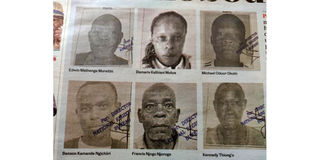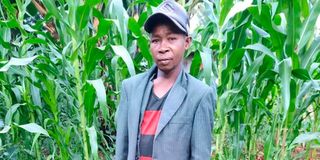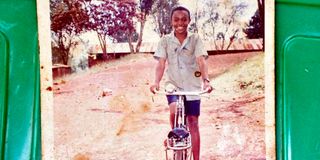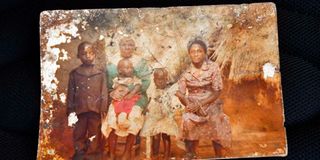Premium
The nobodies: The intriguing tales behind Kenya's unclaimed bodies

Some of the Kenyans whose bodies have not been claimed for burial by their families.
The dead are usually held in high esteem in African customs. That is why their bodies are treated with utmost respect, and burials involve elaborate cultural and religious ceremonies.
But this is not the case for the tens of unclaimed bodies that are buried by urban authorities across the country every few months.
On March 4, the Office of the President published in the dailies names of 171 unclaimed bodies, issuing a seven-day notice to their relatives to get in touch with the City Mortuary and Mama Lucy Funeral Home.
Upon the expiry of the notice, the bodies would exit the stage – without the knowledge of their loved ones.
Normally, they are pushed by a bulldozer into mass graves and buried. But behind the innumerable lists that public mortuaries mostly publish every year are stories of people whose relatives think they are still alive.

Ms Rose Akinyi looks at some of the old photos of her son Michael Okoth Oduor at Nyager village in Sega, Siaya County. Oduor's body has been scheduled for mass burial at Mama Lucy Hospital in Nairobi.
The Saturday Nation sought to establish why the bodies end up unclaimed. We traced some of the relatives of the individuals whose bodies had been listed as unclaimed by the Nairobi Metropolitan Services (NMS), through the Executive Office of the President.
The findings are as moving as they are sad. In Machakos County, Mr Ndambuki Mutua is the only surviving kin in a family of five. Five years ago, the Mutuas buried their father. Shortly after, the youngest son in the family also died.
Family disintegrated
Their mother had died in the early 1990s, after which the family disintegrated. Her presence and love was the only binding fabric that had held them together. At the time of their mother’s demise, Mr Ndambuki’s sister, Damaris Kanini Mutua, was in Class Six.
He does not remember their family ever gathering again after the mother’s burial. “I last talked to my sister Damaris in the early 90s on phone,” he said.
When they spoke, she told him that she lived in Mukuru kwa Reuben slum in Nairobi.
But he was not the only one who had hoped to hear from Damaris. He recalls that until his death, their father had wished that his firstborn daughter should bury him. When it dawned on him that he may never see her again, Ndambuki says the family’s efforts to trace her were futile.
Three decades later, on March 16, the Saturday Nation visited Mr Ndambuki with the news of his sister’s death. He had just returned from the burial ceremony of a distant cousin in the village when the area assistant chief summoned him to meet us. He did not know the news we were bearing.
He remained stoic but silent for almost a minute after hearing the news. After composing himself, he said: “If there are any pending mortuary bills that come with this, then she should just be buried in the fields together with the other unclaimed bodies”.
Heartbroken
He added: “As you can see, I have nothing to sell to help me get her home. I’d love her to rest here eternally, beside our dad, but I’m short of finances.”
Ndambuki lives in a 10 by 10 metres shack in Ng’alalya village, Ngiini in Machakos County, with the house sitting on an 80 by 30 metres piece of land.
“If there’s any way we could assist, we will. Especially with the burial once the body is home,” said the area assistant chief, Madam Leah, while commiserating with Ndambuki. Ndambuki is speechless as we leave.
A few minutes past noon, the Saturday Nation crew arrived in Thiongo’s village in Maiini, Ting’ang’a, Kiambu County.
When Kennedy Thiongo left home for Nairobi mid-last year, he was heartbroken because his wife had abandoned him and left him with a two-year-old daughter. He plunged into alcoholism – his new found solace. His mother, Nancy Wanjiku, was seated near her house when we arrived.
She is warm and cheerful as she “welcomes visitors from Nairobi”. She had not heard from her son, 37 for months. Her broad smile slowly fades when we break the sad news. She starts wailing.
Charles Mimi says Thiongo, his brother, always called home whenever he could. But he had not done so for long and they had only hoped he was okay.
In Nairobi, he worked as a tout with Forward Travellers matatu sacco that plies the city centre-Kayole route. The family said he used to visit their rural home during December festivities. But when he didn’t last December, they thought he had kept away due to the marriage woes.
“We always thought he would return home. We are shocked his body is lying in the mortuary,” Mimi said.
Like Thiong’o, Micheal Oduor Okoth was in search of greener pastures when he left Siaya for Nairobi. But death lurked in his pursuit for financial liberation.

The late Kennedy Thiongo in a past photo pictured on March 18, 2022.
His mother Rose Akinyi, now widowed, received a distress call from an unknown number on the morning of August 13, last year.
The caller said that her son had gone missing, but she dismissed the news, hoping to reunite with him.
That evening, the caller said Okoth, 31, had not returned to his house. It might have been a concerned Nairobi neighbour or the caretaker of the plot where he lived, she said.

Mama Lucy Kibaki Hospital in Nairobi on December 22, 2020.
This was the beginning of a long and agonising search for Ms Akinyi’s “young, industrious, and promising” firstborn son. It finally ended on Wednesday afternoon last week, when the Saturday Nation broke the news of his death to her. Her son's body was among those listed as unclaimed by the NMS.
Okoth had left home 10 years earlier to join his uncle in Nairobi in search of a job after sitting KCPE exam. In Nairobi, he had, through apprenticeship, learnt plumbing. Until his death, his mother says, he was working as a plumber and he often supported her financially.
But he suddenly stopped, raising the first red flag. His mother says she travelled to Nairobi to find out what had happened.
"He looked weak, his eyes were also red, suggesting he was using drugs, something I confirmed from his wife,” Akinyi recalled.
They would later speak regularly. January last year, says the mother of five, he did not show up at his sister’s dowry ceremony noting he was not stable financially.

Benson Kamande Ngichiri pictured in November 2002 before he died.
That year in June, she says she learnt that his son had separated with his wife, but the two families were keen to reunite the two.
“That was the last time I talked with my son,” the 51-year-old Akinyi says. “The next time I heard about him was when the stranger called me. Now you are telling his body is unclaimed at the mortuary."
The family had visited the City Mortuary, Kenyatta National Hospital and Mama Lucy Funeral Home in search of Okoth but they did not find him. They gave up the search.
Hawker
Okoth’s uncle identified as Odongo said that the family would transport the body to Sega sub-location, Siaya County for burial.
“Luo customs demand that the deceased be buried at the family home. We’re glad that we will now accord him a befitting burial,” he says.
Separated by geography but united by fate, Benson Kamande Gichiri’s body, like that of Okoth, is lying in the mortuary, about to be disposed of.
Gichiri, 35, the last-born in a family of three boys, hailed from Gikomora, Maragua.
Having completed his A-level at Muthithi Secondary School, he also left home in search of greener pastures in Nairobi, where until his death his family knew he eked out a living as a hawker. He lived in Dandora estate.
Back in his village, it had been almost five months since his mother, Margaret Ngendo, last heard from him. She says her son never owned a phone but wherever he was in a position to call, he would.

The late Damaris Kanini Mutua (second right, little girl in a white dress) pictured in an old family photo at their family home in Ngiini, Kathiani Constituency pictured on March 18, 2022.
His wife, the mother says, had separated with him a few weeks after he fell sick.
“He told me he was suffering from tuberculosis, but he exuded confidence that he would recover,” she recalls.
When the Saturday Nation broke the news of his death, she mourned his last born son.
While some of the unclaimed bodies will be leaving in hearses for burial to various homes, others will have to wait for a court’s decision to allow NMS to bury them in a mass grave.
For Philip Gitagia Wanjiru, whose body is lying at Mama Lucy Kibaki Hospital in Nairobi, it may be disposed of soon. He was hospitalised sometime in July last year and died later at the hospital. His family is, however, not aware of his fate.
Records show that he hailed from Githumu sub-location, Ruchu location, Kandara, Murang’a County.
The Saturday Nation traced his home, starting at Githumu chief’s camp. Ideally, chiefs are required to be permanent residents of their specific locations as that allows them to know the area and its population well. They are also required to be familiar with the clans in the area and family hierarchies.
But the hopes of identifying Wanjiru’s relatives suffered a setback when area chief Joseph Mugo said he did not recognise the name. He, however, promised to check with his assistant chiefs as well as other administrators in the area.
At the Githumu Police Station, where we sought to know whether Wanjiru had been reported missing by anyone from the area, there was no such a report.
But the officers at the report office directed the Saturday Nation to locals around the station to ask for the family name Gitagia. There was some hope when a trader said that the name sounded familiar and directed us to Kiguoya village in Gacharage, just outside the Githumu town centre. In the village, we were directed to the Gitagia family home. At this point, there was some glimmer of hope that we had a good lead.
On the identification records, Wanjiru’s mother is listed as Grace Wanjiru. At Kiguoya, we met a woman by the name Wanjiru, but her first name is Lucy, not Grace.
The elderly woman, who we thought was Wanjiru’s mother, also denied knowing the man in question. “Gitagia is my late husband's name but I do not know anyone in my family by the name Philip Gitagia Wanjiru,” she said.
Friday last week, Mr Mugo told the Saturday Nation that the search had borne no fruit.
“I circulated the information at our baraza and so far nobody seems to know him,” he said.
It was the same script for Eunice Wangechi Muthoni of Gathage village. She, too, has been disowned by all the three chiefs in Kiganjo division, which is listed as where she hails from following details obtained from the national registration bureau records and captured in her national identification card.
Additional reporting by Nicholas Komu






